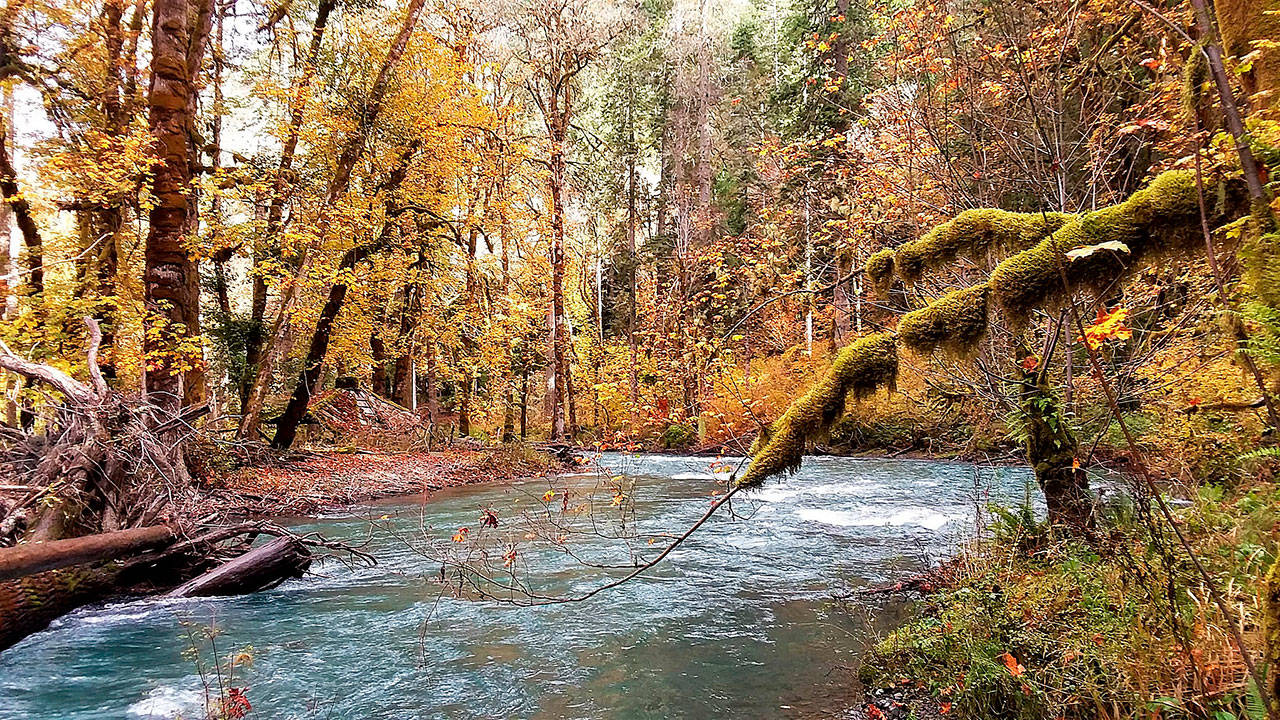CHINOOK OF HATCHERY origin still make up nearly all of the returnees to the Elwha River, and that genetic makeup may be the reason why kings are having difficulty in recolonizing the upper reaches of the river.
It’s all a matter of perspective when looking at information on Elwha River chinook returns.
Lynda Mapes wrote an all-encompassing article on the return of Elwha chinook in the Oct. 18 Seattle Times (“The Elwha Dams are gone and chinook are surging back, but why are so few reaching the upper river?”).
The headline was either a glass half-full or half-empty, depending on your perspective on the project.
Sonar stations that beam sound waves across the river and redd surveys point to adult chinook returns reaching levels not seen since the mid-1980s. Those returns are estimated at more than 7,600, according to a 2019 report on the state of the Elwha five years after dam removal by Lower Elwha Klallam Tribe Fisheries Habitat Biologist Mike McHenry.
Those aren’t massive returns but provide a measure of positivity when looking at Puget Sound-area rivers, many of which have seen populations continually decline through the decades.
Kings are returning to the lower and middle stretches of the river, no surprise given the Lower Elwha Klallam Hatchery is located below both dams and hatchery fish tend to return from whence they came to spawn.
The hatchery uses Elwha River gene stock descended from summer-run chinook formerly used in a state hatchery program dating back to the 1930s, not the genetic mix of kings from a number of different rivers expressed in other hatchery programs.
But the fish that reached the upper stretches of the Elwha only live on in oral histories as those 100-plus-pound Elwha tyee were a spring-run, wiped out by the introduction of the dams.
It’s possible the summer-run hatchery offspring just don’t have the chops to get upriver, survive and thrive like those spring-run tyee once did.
Despite those concerns, efforts to bolster populations between the two former dam sites is underway. Last year, the tribe relocated 614 kings (201 males, 410 females) upstream to a release point just above the Olympic National Park entrance.
The tribe has suggested taking matters a step further, transporting kings into the upper watershed.
“Actively transporting adults would place more fish into suitable upriver habitats potentially accelerating the recolonization of habitats high in the watershed,” said a 2019 report authored by McHenry, state Department of Fish and Wildlife’s Joe Anderson and NOAA’s George Pess. “Some believe this carries risks of undermining natural ecological and genetic processes that may be important for successful numerical and spatial expression. Others think that the level of risk is low in areas where chinook are currently in extremely low densities, and if progeny of adults relocated to the upper watershed are not genetically fit, they will simply not survive.”
Todd Myers, director of the Center for the Environment for the Washington Policy Center, took issue with the more rosy picture painted in Mapes’ article in a recent blog post at tinyurl.com/PDN-ElwhaResponse.
Looking at hatchery escapement data over the last several years, Myers notes preliminary summer-run estimates for the Elwha show “chinook returns are the lowest in four years and the second-lowest in the last seven.” He does provide that this year’s lower returns were not unexpected considering the low returns in 2017 as fewer fish spawning will typically result in lower returns down the line.
Park pond stocked
A total of 200 trout were added to the Carrie Blake Park Pond in Sequim by members of the North Olympic Peninsula chapter of Puget Sound Anglers and Fish and Wildlife.
“The fish are averaging about 1.5 pounds,” chapter vice president Dave Croonquist said. Plans are to continue stocking the pond with similar plants over the next few weeks.
Kids ages 14 and younger can fish the pond and keep the first two trout they catch with no need for a fishing license.
________
Sports reporter Michael Carman can be contacted at 360-406-0674 or mcarman@peninsuladailynews.com.

